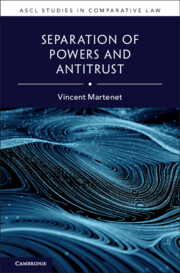Book contents
- Separation of Powers and Antitrust
- ASCL Studies in Comparative Law
- Separation of Powers and Antitrust
- Copyright page
- Dedication
- Epigraph
- Contents
- Preface
- Introduction
- Part I Foundations
- Part II Interactions
- Part III Toward a New Separation of Powers
- 7 General Issues
- 8 Promises and Shortcomings of Recent or Proposed Legislation
- 9 New Politico-Economic Axes of the Separation of Powers
- 10 New Institutional and Individual Axes of the Separation of Powers
- Conclusion
- Bibliography
- Index
8 - Promises and Shortcomings of Recent or Proposed Legislation
from Part III - Toward a New Separation of Powers
Published online by Cambridge University Press: 28 September 2023
- Separation of Powers and Antitrust
- ASCL Studies in Comparative Law
- Separation of Powers and Antitrust
- Copyright page
- Dedication
- Epigraph
- Contents
- Preface
- Introduction
- Part I Foundations
- Part II Interactions
- Part III Toward a New Separation of Powers
- 7 General Issues
- 8 Promises and Shortcomings of Recent or Proposed Legislation
- 9 New Politico-Economic Axes of the Separation of Powers
- 10 New Institutional and Individual Axes of the Separation of Powers
- Conclusion
- Bibliography
- Index
Summary
The digital economy raises important concerns relating to the concentration of economic-political power and, consequently, to the separation of powers in a broad sense, or more narrowly to checks and balances. Several recent or proposed pieces of legislation, especially in Australia, the European Union, Germany, India, Japan, South Korea, the United Kingdom, and the United States aim at tackling some issues posed by large digital platforms. These recent or proposed pieces of legislation all address important issues in the digital economy, and some of them could contribute to reduce entrenched market concentration, however, to a degree that remains to be defined. The most comprehensive set of bills from this perspective was introduced in the U.S. Congress during the last two years. However, even in this country, the concentration of politico-economic power in a few firms and the control of the digital infrastructure of democracy by them would remain widely unregulated, as in other countries, should Congress pass the proposed bills.
Keywords
Information
- Type
- Chapter
- Information
- Separation of Powers and Antitrust , pp. 122 - 139Publisher: Cambridge University PressPrint publication year: 2023
